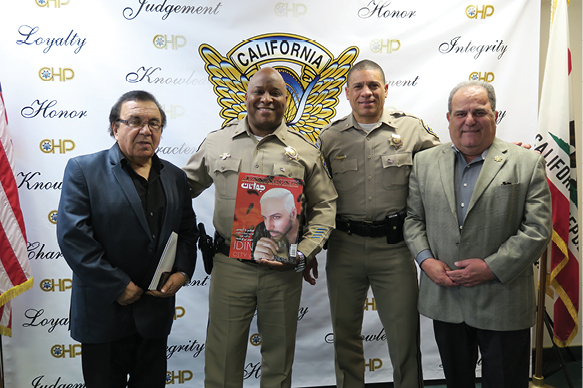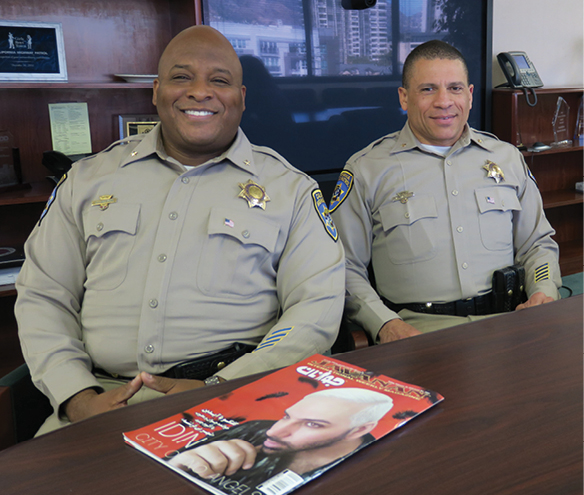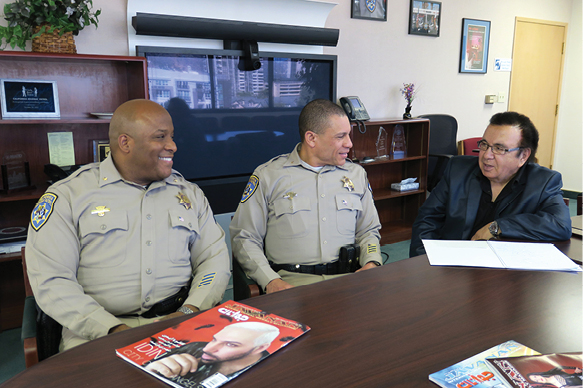
Javanan: You started twenty seven years ago working in this office . I want to ask you why did you decide to work in this office?
CHP Assistant Chief Mark Garrett: I have worked in the Los Angeles area my entire career. It is my home. I started as an officer in LA county and it is a privilege for me to work here at Southern Division Headquarters.
Javanan: Is this the headquarters?
CHP Assistant Chief Omar Watson: Yes, this is the division for LA County.
Javanan: What is your idea about that?
Assistant Chief Garrett: I am probably the luckiest person on the highway patrol. Because spent my entire twenty seven years career here in Southern Division. I was born in Hollywood and grew up in Southeast Los Angeles and later in San Gabriel Valley, Alhambra, and Arcadia. Most people have to move to different parts in order to promote. I’ve been very lucky to promote to my current rank all within Southern Division. Just ten miles from my home and just as Omar said, working here. I am so grateful.
Javanan: Did anything change here in this region?
Assistant Chief Garrett: No, but the relationship between other agencies like LAPD, Sheriff Department, Fire Department have grown and are stronger than ever. We all work together and over the years the relationship has increased. And the public will understand regardless which department we are working for. We all have the same goal of public safety. I think one of the things has driven the evolution is now more complicated is social media. Because everything that happens now is instant. Everything goes onto the internet and cyberspace. We hear about the incidence that may one of our employees involved through social media before you get a phone call from the other manager or supervisor. It’s so quick and really affects how we manage our department and understand the importance of social media. Our long time vision is one step ahead, quite different from twenty seven years ago.
Javanan: Could you explain your responsibility in CHP and also how you work with LAPD and Sheriff Department?
Assitant Chief Garrett: Highway patrol started in 1929. We came into existence as primarily a traffic enforcement entity. But our role has evolved immensely since 1929 we have grown into fourth largest law enforcement agency in the country. So our role is a lot more general law enforcement than it used to be. Now we talk about drug trafficking, human trafficking, terrorism. We are very involved with other agencies and task forces. We have got very close relationship with Los Angeles Police Department, Sheriff’s Department, FBI, Secret Service and U.S. Marshals. We all have a lot of common goals in responsibilities in place and resolve all together. We learn from each other through training and we sharing information. We help each other to become better law enforcement agencies to work together.
Javanan: You are very involved in community. Are you also involved in sport events?
Assistant Chief Garrett: Yes, we have so many ties in community. We have a lot of interaction with people. We are engaged and help people in sports events. It is important for the people to see us not as a police officer but see us as a human to help them decrease the anomisity between police officers and citizens.
Javanan: When a terrible news comes up about officers being killed in line of duty, how do you handle It?
Assistant Chief Watson: It really affects us very deeply so the department has a very strong program. We have trained counselors that come in the office to work with our officers on how to deal with this traumatic incidence. We also have psychological doctors who help our officers to deal with the loss of the officer.
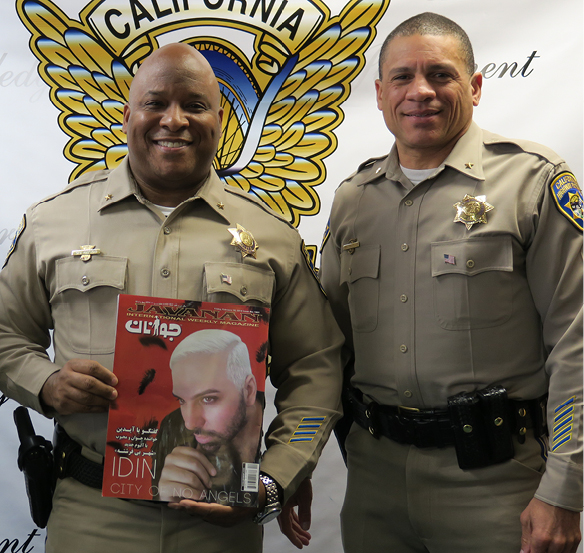
Javanan: How about the future of CHP and the law enforcement?
Assistant Chief Watson: That is a great question. We think about it on the daily basis. As quickly as the society and culture and the law enforcement has changed in last twenty years, it is changing faster now. One of the big changes is autonomous vehicles. Those vehicles coming with no drivers. So we have to re-evaluate what is our role. What will be our function.
In the State of California, there is plenty for us to do, but there is great need for law enforcement in civil society as much as possible. We are exploring new ways for us to remain and become more relevant. One of the things becoming a reality is high speed rail project. That is going to run a good portion for Californians and somebody in the law enforcement has to be responsible for policing that entity and most likely it would be CHP. That is because it goes through multiple counties and state law enforcement to handle a lot of that. That may require thousands of officers coming on board. Also we are always involving these task forces for state security and different traffic issues like drug trafficking, human trafficking and auto industry theft.
Javanan: Are you hiring new personnel for CHP now more than years ago?
Assistant Chief Watson: We have a problem getting the people for this department. There are constantly people want to come to this job.
We got problems when it come to marijuana use and also physical fitness of those who want to come to the organization. We also have difficulty getting people who have a driver’s license because now a lot of young people get driver’s license at twenty two or twenty three or twenty four years old instead of getting at sixteen years old. They rely on public transportation or ride sharing like Uber so we have difficulty in high speed situations because they have no exposure in handling high speeds. If you use marijuana or any kind of drug for a certain amount of years you will be disqualified from being hired by the department.
If you are young and are going to apply you must be physically fit. I am now forty six years old and I am still working out, but some of these people are eighteen and sixteen, they’re not engaged in physical activities.
Assistant Chief Garrett: I agree with Omar. There are still a good number of people applying for the job even when they have a different perspective about the force. Sometimes their perspective is driven by social media or CSI and they think major crime could be solved within twenty four hours. Any one who submits an application, they must begin working out right away to be physically fit for the job.
Javanan: What do your families think about your job?
Assistant Chief Mark Garrett: I am now fifty-four years old. I remained single until six years ago. Now I am married and have a four year old son. My wife is a professional civilian employee of a city government. She met me in my uniform when my role as an officer was to attend a meeting on behalf of the CHP. My wife understands the role of my career. She is very supportive. Before my parents passed away they were very supportive as well.
Assistant Chief Watson: I am married now, too. My family is very supportive and respectful of my job. I am the only police officer in my family. When I received the letter congratulating me for making it into the CHP, my mother opened the letter for me and was crying in joy. She was so happy I was accepted into the CHP. My whole family appreciates what I do. It is the career I dreamed of all my life.
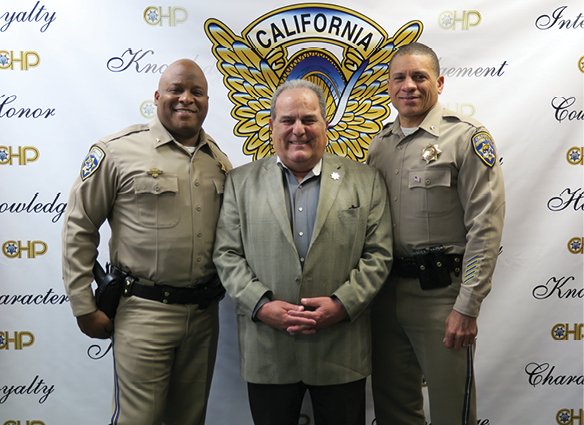
Javanan: What about marijuana acceptance and what is the enforcement law?
Assistant Chief Garrett: That is a very good question.
Proposition 64 and the California Highway Patrol is unique in law enforcement as relates to new Marijuana used for recreation and legalization. So we are the only agency granted a federal grant actually doing research and planning for the enforcement of Marijuana as DUI or other drugs. So people do not understand that using Marijuana is very much like using alcohol specially when it relates to driving an automobile.
Although the enforcement guidelines are in the evolution process. When an officer believes you are under the influence after observation and tests, you can be arrested.
Now the prosecution of the arrest is different story. The officer knowing, can, and also has an obligation to take you off the road from behind that wheel. Even prescription medication that you obtained legally, if you had too much in your system driving that officer enforces it as DUI like any other substance.
Javanan: Smoking marijuana is legal but can you actually smoke?
Assistant Chief Garrett: You can not smoke marijuana in your car because it is going into your system. You are going to get arrested and you are going to jail. You can not smoke it walking down the street. You can not smoke near schools or public places. This law applies only to your residence. I saw someone at a restaurant they lit up while leaving restaurant, it was against the law. Your readers need to understand that they have to make sure if they have the legal amount of doctor prescribed marijuana in their possession it is fine. But if it is in their car they are going to be arrested. Same thing smoking on the street where kids are present. They need to educate themselves by going on internet and learn about the proposition 64 specifics.
Javanan: May I ask about speed limit. Are they going to change?
Assistant Chief Garrett: Some. I wont go into specifics but every city or county has a great deal of latitude when It comes to speed laws, speed enforcement cities or counties and so what a particular city council or whatever the governing body does it is up to them. It is a very broad issue. It is very different for freeway speed limit is their statute they are lot generally related to speed survey or things like this. They are generally determined by speed survey and a lot more by engineering, traffic engineering or local jurisdiction speed limit. So sometimes It seems to have some affect on us.
As CHP, we actually do patrol county roads and obviously we won’t enforce. Speed limit as a county entity, we are not generally part of determination speed limit .We only enforce what another entity set as the speed limit .
Javanan: There are a lot of Iranians who are interested in being hired by your department. How can they apply for this career?
Assistant Chief Watson: They can go to our website, www.chpcareers.com. They will click on the become a cadet link and fill out the application. When it comes to the testing phase, the division you choose is important. LA county is the Southern Division. If you list Inland Empire, then you will test in the Inland Empire. San Diego is the border area division. Applicants should make sure they choose the right division. If they choose the wrong one they will have to drive to that division for the testing. We are open everyday of the year. When you apply, you are now in the system and will take written tests and background checks. The process will take almost a year to finish. They should use this opportunity to work out so they are physically ready for the job. The first running test is two miles in under eight minutes. If you currently take fifteen minutes to run five miles, then you will be wasting your time. The academy is not there to get you in physical shape, you will have to start over if you are not ready.
Javanan: Do you have enough Iranians applying for the job?
Assistant Chief Watson: There are not enough African Americans, women, Asian, or Caucasians. Before the Caucasians were the leader in applicants, now Hispanics are leading the applicants. We love for all people to apply for the job.
Javanan: Do you have any recommendations for the Iranian young people?
Assistant Chief Garrett: I have the same advice for all young people. I encourage everyone to reach out to law enforcement to open up the whole world. Whether they are doctors, lawyers, or veterinarians, we should seek all the avenues to exchange ideas. Use the churches, mosques, synagogues, that is where the tough questions are asked. Find out what we really do. It is really important for individuals and groups to reach out, find out what we actually do, and how much we engage in the community. Come see all of us, we love exchanging ideas with the community. That is my recommendation. You must initiate the the conversation and not be afraid of us.
